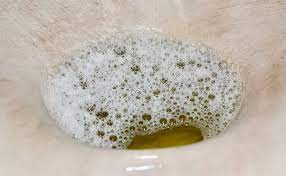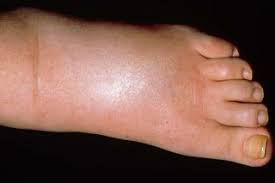10 CKD symptoms (and what causes them)
Keep track of your kidney data with PKB
- Urinary symptoms
- High blood pressure
- Shortness of breath and ankle swelling (red flag symptoms) – you need to see a doctor soon
- Tiredness
- Pain
- Muscle weakness
- Not being hungry
- Itching
- Poor concentration and sleeping
- Other (non-specific) – including a feeling of deep cold, leg cramps and restless legs.
This article is linked to another of the 10 complications of CKD.
Symptoms and complications
The symptoms of CKD relate to the complications, but it is not a one-to-one relationship, i.e. each symptom may have 2 or more complications that cause it (e.g. tiredness). And some complications have no symptoms at least initially (high blood pressure).
Introduction
The commonest symptom of CKD is .. no symptoms. This is because, especially in the earlier stages (CKD1-3), there are none, or few and non-specific (e.g. mild tiredness). This is why 90% of people don’t know they have it. This has been emphasised by Darren, the Tiktok Kidney Warrior. This is Darren’s story.
These symptoms usually do not occur until the more advanced stages of CKD – i.e. CKD4 and CKD5. Ask you doctor or nurse which stage you are at (stages of CKD are explained in this article).
Many of these symptoms are non-specific, i.e. can also be seen in other diseases. Nonetheless, for each symptom we will describe the treatment, i.e. what can be done to get rid of or control the symptoms.
But there are 10 symptoms of chronic kidney disease, which we will now go through, with the help of the CKD Tiktok Kidney Warrior – Darren Daniel.
We will also describe what causes them (if known), and what can be done about them
More about Darren here.

This is Darren
1. Urinary symptoms (variable causes)
Surprisingly as CKD is a kidney disease, most patients with CKD pass urine normally. But some patients do get symptoms in their urine. We will now go through them.
- More frequent urination (peeing) – this can be sign of obstructive nephropathy (especially due to disease of the prostate gland in men)
- Passing urine at night. Especially in advanced CKD (CKD4-5) there is reversal of urine making, in terms of time of day – i.e. people pass the majority of their urine at night rather than the daytime. It can be very irritating and disturb sleep a lot (see below)
- Passing less urine
- Blood in the urine (on a dipstick, i.e. hat you cannot see). This is surprisingly common, affecting 10% often population. Most have no significant kidney problem, especially if its the only symptom they have
- Foamy urine (i.e. with lots of bubbles) – often a sign of nephrotic syndrome and chronic glomerulonephritis.

Urine is normally a little foamy. Its about the amount of bubbles and foam – is it more than normal for you?
Note. Some people pass too much (poor quality) urine, not less. You cannot tell by looking at urine that it is ‘good urine’ (i.e. clearing waste).
Treatment
The treatment for these urine symptoms depends on the cause. This is why its so important to get a clear diagnosis (i.e. exact cause of your CKD). CKD is not a diagnosis. It is a syndrome, with multiple causes (7 main causes). They are different with different treatments.
2. High blood pressure (BP) (complex causes, including fluid overload, see below)
Doctors call this ‘hypertension’. You cannot ‘feel’ when your blood pressure is high. It is a problem that does not have symptoms (called ‘silent’). And most people with CKD have raised BP. There is a lot that can be done about it. Normal blood pressure is 120/70 to 140/90, depending on your age – the older you are, the higher the BP.
Having normal (or better low) BP is the single most useful treatment for all people with CKD. You should aim for under 130/80 all the time (at home, GP or hospital).
Treatment
There are a lot of effective drugs that can be used to lower blood pressure – e.g. Bisoprolol, Amlodipine and Doxazosin. Two groups of drugs called ACE inhibitors (‘ACEs’; e.g. Ramipril) an ‘ARBs’ (e.g. Losartan) are especially useful in some patients with many CKD patients, as they reduce the protein in the urine too. Reducing the protein level in the urine of CKD patients is important to improve the kidney function.
Diuretics (water tablets) are also used to control blood pressure as they reduce fluid overload (which is part of the cause of the high BP) – see below.
The treatment of high BP is more effective if you follow a low salt diet. Talk to your dietitian or GP about how to start a low salt diet.
3. Shortness of breath and ankle swelling (too much water in the body) – red flag symptoms
Doctors call this ‘fluid overload’. The water goes to your legs or thighs, and in some patients, around the eyes, abdomen and genitals. After that, the water can go into your lungs. This problem largely shows itself as leg and thigh swelling, and shortness of breath. Ankle swelling and especially shortness of breath is a red flag symptom.

Foot swelling seen in a patient with fluid overload
Treatment options
- Diuretics (‘water tablets’) – e.g. Bendroflumethiazide, Furosemide or Bumetanide. Diuretics stimulate the kidneys to make more urine. This will help remove the excess water from the body. They also reduce blood pressure (see above)
- Fluid restriction – it may also be a good idea to reduce the amount of fluid you drink a day – usually the limit is set to 1.5 litres (or less). Only do this if you are asked to do so by your doctor or nurse.
- Dialysis – if the above does not work, dialysis may be necessary.
Alcohol is not banned in CKD. Alcohol does not affect the kidneys. It is the volume of fluid drunk that can be a problem. So a glass of wine, or a short, may be a better option than a pint of beer as they are lesser in volume.
4. Tiredness (partly due to anaemia)
Many patients with CKD4-5 have anaemia, which means a lack of blood in the body which can make you tired. This is easy to treat, with a drug called erythropoietin (EPO), which is given as an injection or tablet. Either will give you more energy, and may improve impotence and sex drive (see below).
Note. Tiredness has other causes, including low blood pressure.
Treatment
Erythropoietin (EPO) given as either injections (e.g. Aranesp) or tablets (e.g. Roxadustat). When the haemoglobin (‘HB’; blood marker of anaemia) falls below 100 g/L, EPO should be considered. The target HB is 110-120 g/L. Iron tablets or injections may be necessary too. Ask your kidney doctor or nurse.
5. Pain, especially in bones (partly due to renal bone disease)
This is also called ‘renal osteodystrophy’. Untreated it can lead to pain in the bones, or even fractures. It is shown by low calcium, and high phosphate and parathyroid hormone (PTH) levels in the blood.
Treatment
– e.g. Calcium Acetate, Alfacalcidol (a form of Vitamin D) and Cinacalcet.
6. Muscle weakness (may be due to too much potassium and acid in the blood)
Muscle weakness can be caused by several things in CKD (including anaemia). But these are the two most important causes: Hyperkalaemia (too much of a mineral called potassium in the blood) and ‘acidosis’ (too much acid in the blood). This is because high levels of either can have serious consequences (see below).
Potassium and acid are waste products of food that are not removed from the kidneys properly in someone who has CKD. They do not usually lead to specific symptoms.
However, if the potassium is very high (over 6.5 mmol/L, normal levels range 3.5-5.3 mmol/L), it can cause muscle weakness. That may show itself as (1) whole body muscle weakness, or (2) cardiac arrest and sudden death (as it also affects the heart muscle). Cardiac arrest is sudden stopping of the heart.
Treatment
- Alkali tablets – e.g Sodium bicarbonate. Patients with high levels of acid in their blood will benefit from these tablets. Alkali tablets are used to balance out the acid.
- Diet – some patients, whose potassium levels are too high, may be asked to reduce the potassium in the diet. Do not do this unless asked to. Speak with your GP or dietician for advice on which foods to avoid or reduce.
- Diuretics (see above) – most diuretics have a side effect that helps remove potassium and acid. This will also help.
Dialysis – if the above does not work, dialysis is required
7. Not being hungry (cause unknown)
Nausea, vomiting, not being hungry, and losing the taste for food (some patients describe it having a metallic taste) are all dietary problems linked to CKD.
Treatment
- Diet – a low protein diet may improve the symptoms of CKD. Talk to your dietitian about that.
- Dietary supplements – again, talk to your dietitian.
We know we know. If you follow all the dietary advice in CKD (low protein, phosphate, sodium .. blah blah blah), you will eat nothing but boiled rice. You need to balance the gain (often not a huge amount) with the loss of quality of life by being over strict with your diet. Discuss this with your dietician, or kidney doctor.
8. Itching (cause unknown)
This is one of the most unpleasant (and hardest treat) symptoms of CKD.
Treatment
It is useful to control blood calcium and phosphate levels. When either (or both) are high, this can sometimes contribute to itching. So ask your doctor to get the levels down. Drugs like Gabapentin (normally for pain) may also help. Your unit may have a ‘symptom control nurse’ – ask to see her/him if they have one.
9. Poor concentration (‘brain fog’) and sleeping (causes unknown)
The cause of these symptoms is unknown. Also poor sleeping can be partly due to extra urination at night, see point 1.
Treatment
Mirtazapine or Quetiapine for difficulty sleeping.
10. Other symptoms (non-specific)
Include lack of sex drive, impotence, depression/anxiety, a feeling of deep cold, leg cramps and restless legs (causes unknown)
Pain and a feeling of deep cold are common symptoms of CKD. Both are unpleasant
These symptoms (and itching), are hard to control. A well functioning transplant is the best treatment.
Treatment
Clonazepam (restless legs) and Duloxetine (anxiety/depression and pain) may be useful. Some renal (kidney) units have specialised nurses that are expert in dealing with these complex symptoms. Ask.
Note. Erythropoietin (EPO; see above) may help. Raising the haemoglobin with EPO can help many symptoms, including impotence and sex drive.
Other strange symptoms
Cough
This can be due to fluid overload but also a side effect of ACE inhibitors (like Ramipril).
Summary
We have described 10 CKD symptoms (and what causes them). In the early stages, CKD is ‘silent’ – i.e. there are no symptoms. If CKD progresses, shortness of breath and ankle swelling are red flag symptoms. Seek medical advice soon if these occur. If present, they should alert you to the need for diuretics (‘water tablets’) or dialysis.
Itching, pain and poor sleeping are difficult to treat – but things can be done for both.
Note. A well functioning kidney transplant is the only way of getting rid of most symptoms in CKD5 (kidney failure).
Top Tip
Even though high blood pressure is silent (without symptoms), it’s important for you to take your BP regularly and keep it below 130/80.
Other resources
10 common CKD symptoms (shorter article)
10 CKD complications
CKD facts and stats 2024
Last Reviewed on 24 June 2024
